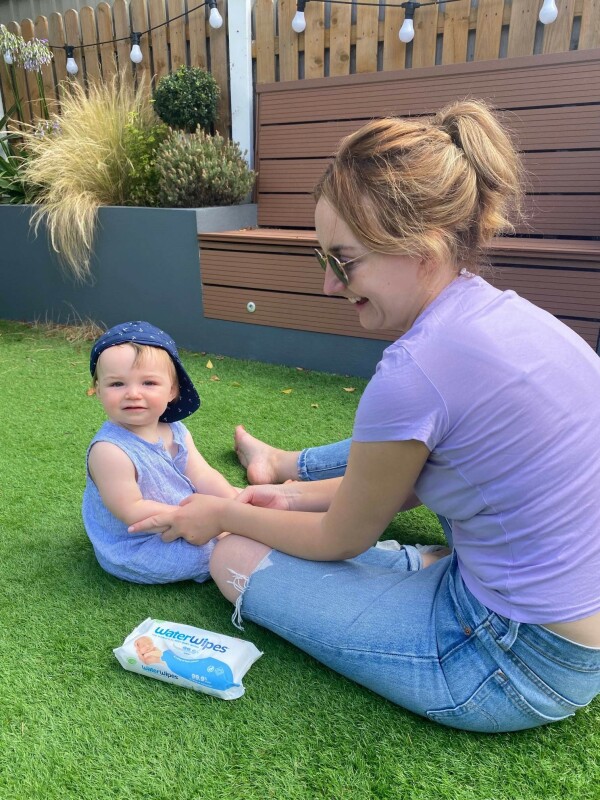
Motherhood and mental health: Caroline Foran on managing anxiety and confidence for mums
Any mother who’s into her self help books will recognise Caroline Foran’s face from her author bio or her Instagram page. A best-selling author, hit podcaster and mother to adorable Caelen, she’s helped thousands of people address their anxiety and stress in a no-frills, straight-talking manner that’s a refreshing voice in the self-help section.
We caught up with the new WaterWipes spokesperson to talk parenting anxiety, dealing with hysterical parenting culture and how she’s written three books in the last five years – and also had a baby! She opened us to about her routine, anxiety management tips and how your partner can help during your anxious periods.
Anxiety at any stage of life is particularly difficult to deal with, but as a mum, it can sometimes feel impossible to manage. How can mothers looking to ‘assess and address’ their anxiety take that first step?
The first step, I think, is always to acknowledge the presence of anxiety with yourself, and if you can, vocalise it with someone who you trust. When you have someone else to unpack it with, that person can often help you to see that of course what you’re feeling makes sense, they can see the wood for the trees and maybe you, in the thick of it, cannot.
Maybe you think you’ve no reason to feel this way but someone else can see it clearly – because they are better able to look at your situation compassionately. It’s really important to understand why you’re feeling anxious, what is happening in your body, how much sense it really does make, and then be really kind to yourself for feeling this way.
Only with understanding and then self-compassion, which are part of the assess side of things, can you go on to address it, by doing the things that you know can help you to feel more balanced. This of course is just my experience and what I find really works.
We all worry for our kids, especially when we’re new mums. There’s such conflicting information and hysteria around what products to use, which parenting methods, which research to read – how can we tune out the noise and be confident and competent parents using the correct products?
Yes I really agree, I overwhelmed myself completely with noise from various experts and never gave myself a chance to trust my instincts, and I think they take a while to develop. We all assume we immediately know our baby and what our baby or our kid needs, but when you’re already overwhelmed as a new parent, it’s natural to want to seek out what the ‘best’ thing is to use.
I found it most helpful to talk to friends I trusted, and just decide on a few key people that you’ll turn to for information – be they experts on Instagram or close pals. Keep it a small circle so that you don’t end up more unsure and also to stack someone else’s advice against what you think would be best. Only when you start to trust yourself, can that ‘knowing’ feeling as a mother really come through.
I also think allowing for trial and error is key. And sometimes that’s hard because we have all, prior to becoming parents, gotten used to the idea that if we work hard at something, it will work out, and with babies, it doesn’t necessarily work that way. So try something that you’ve heard good things about, and if you’re not sure about it, start again.
With three bestselling books out in the last four or five years as well as a hit podcast, how on earth do you find time to juggle everything? What does your normal routine look like? How do you fit in these moments of productivity around being a mum to adorable Caelen?
I’m going to be completely honest: I don’t work anything close to full time hours. I work effectively when I have to and I have childcare four mornings a week from 8.30 – 12.30 during which I get whatever needs doing done. I am so fortunate that over the last few years I’ve been able to structure my working life in this way. It took a lot of hard work to get here but now I’m all about the least amount of effort for the maximum return. That’s my secret!
I don’t say yes to everything. I’m very choosy about events I go to. I outsource the podcast editing now so I just do the recording and the conversation part myself. I do whatever I can to make things easier on myself, I delegate a lot, and I make it a priority to build in as much down time as I can. I order my food shops online. I am looking into getting a dog walker to help with that a few times a week. I spend afternoons with my baby, after his nap, and then after he’s gone to bed, I will completely switch off.
Of course, there are times, if a book is coming out, that I will be busier with publicity or editing a book that’s due to go to print, but it’s never a constant thing; I am super aware of ever burning myself out. I could take on lots more, I could have achieved more than I have, but my wellbeing is the ultimate marker of success for me.
What has your anxiety journey looked like? Are there quick fixes for any of it, or is it a slow, dedicated process?
It looked like this: a shitshow, trying to run away from it, trying not to be anxious, then realising that wasn’t working for me, then working with myself, realising that it’s okay to be anxious sometimes, understanding it better, doing CBT to help, easing off stimulants in periods of heightened tension, making my wellbeing my number 1 priority, learning to be self-compassionate with myself which I would say is the hardest but most significant part.
I don’t think there are any quick fixes, but it can certainly be taken down a notch within minutes if you do some deep belly breathing, for example. For more consistent chronic feelings of anxiety you really have to unpack it, address where it’s coming from and be patient with your body because it’s likely taken a while to get to that point of anxiety or burnout so it will take a while to get back to a sense of calm again. It doesn’t happen overnight if you have been burning out for months on end.
You recently spoke about catastrophising on your podcast ‘Owning It: The Anxiety Podcast’. How can we train our minds not to jump to the worst conclusions when something goes wrong?
We can’t. But we can acknowledge how normal this is. We jump to the worst-case scenario as a way to protect ourselves, it’s in our survival instinct. But we don’t have to latch onto it. Sometimes I will say ‘okay, let’s consider the absolute worst-case scenario here, well what if that happens? Will I be okay? What will I do?’ It helps to take the fear out of it. That’s helpful if I’m thinking that my next book is going to be a flop, for example.
If I am having catastrophic thoughts about bad things happening to my family or something like that, I will turn to some CBT exercises, and put my thoughts on trial. What evidence is there to support this thought? Is it based on fact or opinion or speculation? Catastrophic thinking will happen, if you are that way inclined, but you can effectively dissolve those thoughts or prevent them from consuming you if you work with them.
How has your partner been a part of ‘owning’ your anxiety? Is it a personal journey or is it something spouses can help and support you along the way with?
He has been brilliant. I don’t think I realised just how lucky I got with him until I went through a hard time and saw the measure of his character. He is my person who helps me come down out of anxious worst-case scenario thinking, he is the voice of reason for me, and I am that for him when it’s him feeling overwhelmed. He always helps to normalise it, if I’m feeling it, by saying ‘okay well this makes sense doesn’t it? What would you like to do? Should we talk about it or do you want to just watch something nice on telly?’
Very early on, when I started to feel unwell, he said ‘we will figure this out’, and I realised I wasn’t in it alone and that it was a journey he would be on with me. I acknowledge that not everyone has that level of support but if you can turn to friends or family in the same way, it will be incredibly helpful.
Your latest book, ‘NAKED: Ten Truths To Change Your Life’ talks about being vulnerable and how that can actually be a good thing for our lives and our mental health. Yet when we’re mothers the last thing we want to feel is vulnerable – can you explain how we can balance these two roles? Prioritising our mental health and our children?
Feeling vulnerable is not just normal when you become a parent, I think it’s also part of the process. It’s necessary. You have to feel unsure and out of your depth before you get to a point of feeling like you know what you’re doing. It’s part of becoming a mother, like you don’t just become one in an instant.
I am obsessed with the whole concept of matrescence – it has been really helpful for me. Vulnerability for me is more about authenticity and allowing for your humanness to be present. For me it’s not only showing the best bits on social media – I couldn’t live up to the pressure of pretending like everything is perfect all of the time, and I know it wouldn’t serve anyone following me very well either. It all gets a little bit easier when you accept that vulnerability is common to us all, that it’s certainly present as a parent, and that it’s okay to feel it. It has allowed for far better connections with other mothers, I have found, and made me more confident to figure things out as I go.
Sometimes leaning into your vulnerability is an act of confidence, if that makes sense! So I don’t see them as two separate roles, I see it as all part and parcel of the beautiful, crazy, sometimes tricky but always worth it experience of becoming a mother.

WaterWipes spokesperson, Caroline Foran, was speaking at the launch of the Irish brand’s new ‘ABC of baby skin’, a comprehensive and dermatologist-approved resource to help parents access trusted information as they care for their baby’s delicate skin. Visit abcskin.waterwipes.com for useful information on a selection of the most common baby skin conditions.
